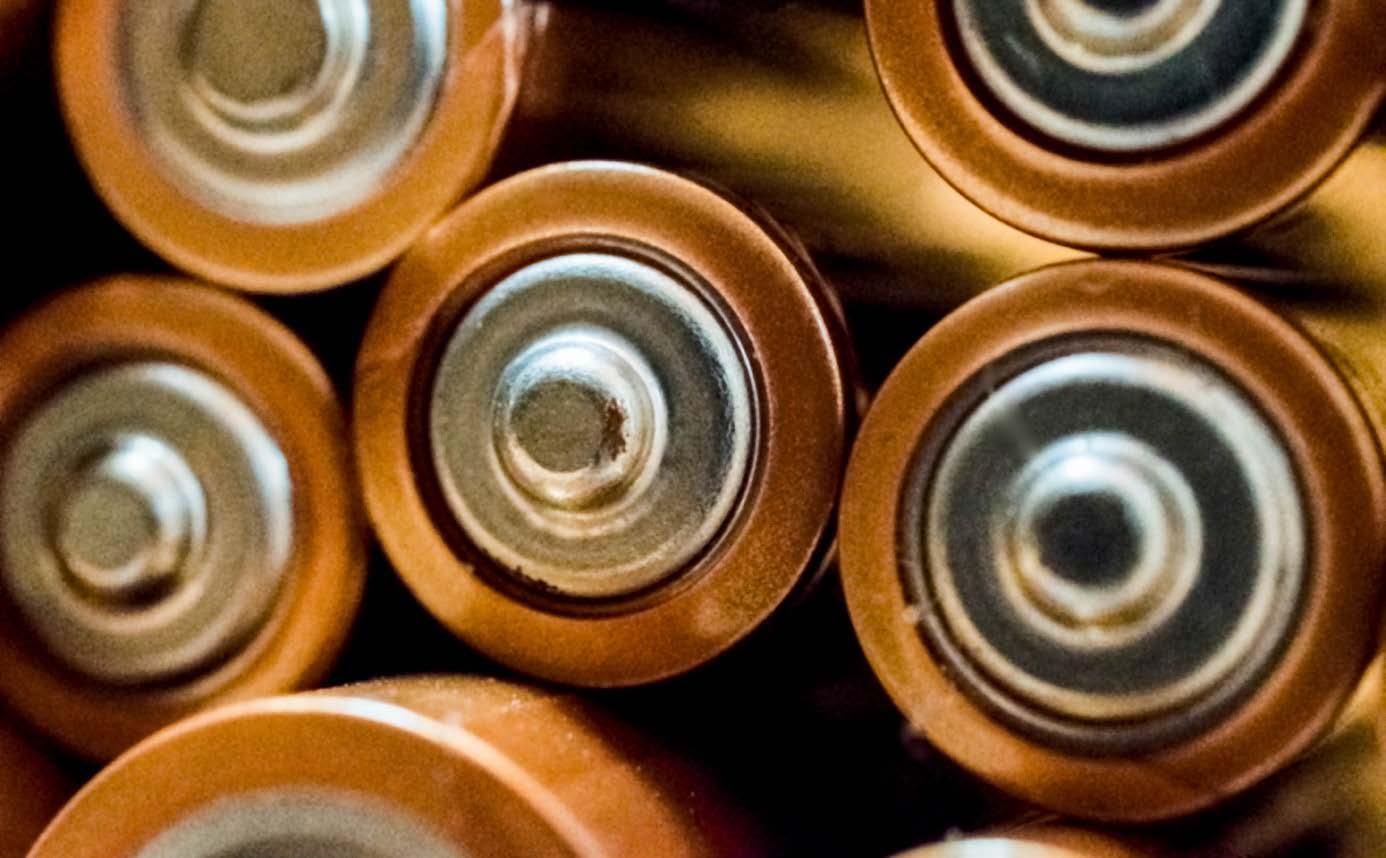
29 minute read
NATIONAL NEWS
by ETNews
Cabinet nod to incentives scheme for ACC battery
Energy Storage With the view to bolster the ACC battery manufacturing represents one of the largest “We are thankful to Amitabh Kant and the NITI Aayog team for their manufacturing economic opportunities for several leadership along with contributions capabilities of global growth sectors, such as from the Department of Science and the country and consumer electronics, EVs, and RE. Technology (DST), Department of enhance exports, the Union Cabinet The PLI scheme for the ACC battery Heavy Industries (DHI), Ministry of today approved production-linked sector is expected to incentivize New & Renewable Energy (MNRE), incentives (PLI) in 10 key sectors large domestic and international and the Ministry of Electronics including Advanced Chemistry Cell players in establishing a competitive and Information Technology (ACC) battery, under the Atmanirbhar ACC battery set-up in the country. (MeitY) in shaping this program,” Bharat (Self-reliant India) vision. In the auto sector, the PLI scheme Dr. Walawalkar added.
Advertisement
The 10 key sectors have received a aims to make the Indian automotive IESA has been actively working total financial outlay of `1,45,980 crore industry more competitive and in this space for the past three over a period of five years, of which, enhance the globalization of the years, collating information from ACC battery has been approved a automotive sector through the latest industry players (IESA member financial outlay of `18,100 crore. incentives. companies) and submitting inputs on Automobiles and auto components India Energy Storage Alliance the discussion for Advanced Battery have been approved `57,042 crore. (IESA), the leading industry alliance Manufacturing in India.
“The PLI scheme will be focused on the advancement "Since May 2019, IESA has implemented by the concerned of advanced energy storage been in constant communication ministries/departments and will be and e-mobility technologies in with the NITI Aayog and other within the overall financial limits India, welcomed the PLI scheme ministries/departments on the prescribed. The final proposals announced by the Government of launch of the Mission," IESA said of PLI for individual sectors will India. in its official statement. In July this be appraised by the Expenditure Commenting on the government's year, IESA wrote a letter to the Finance Committee (EFC) and move, Dr. Rahul Walawalkar, PMO requesting to expedite the approved by the Cabinet,” the official President – IESA said, "This is launch of the Advanced Chemistry statement said. an extraordinary move by the Cell - Gigafactory Manufacturing
The objective of the PLI scheme government and is a result of 4+ Plan. In September this year, with across these 10 key specific sectors years of industry push led by IESA the view to further accelerate their is to make Indian manufacturers and other stakeholders. This national efforts, IESA banded with industry globally competitive, attract program holds immense importance associations like Indian Electrical investment in the areas of core as it is going to accelerate the & Electronics Manufacturers' competency and cutting-edge Atmanirbhar Bharat Abhiyan in Association (IEEMA), India Smart technology; ensure efficiencies; domestic manufacturing, helping Grid Forum (ISGF), ELCINA, and create economies of scale; enhance India to enter the global value Maharaja Agrasen Institute of exports and make India an integral chain for advanced energy storage Technology (MAIT) and submitted part of the global supply chain. technologies.” inputs urging the ministry to take the necessary steps for promoting Advanced Battery Manufacturing in India. IESA wrote multiple letters to the ministry explaining the urgency of the Mission and the need to avoid delays which could lead to India missing out on investment opportunities to other countries. Moving forward, Dr. Walawalkar suggests there is a need for the government to pick some measures for kick-starting deployments of energy storage technologies in a systematic manner that will help investors to commit billions of dollars required for building gigafactories and the rest of the supply chain. Image for representation only This does not necessarily require
the government to subsidize the demand, but to identify applications where these technologies are economical and government agencies can save money by adopting the ACC technologies (similar to how the LED rollout was planned through EESL).
Making SECI a case in point, Dr. Walawalkar proposed that as SECI has already identified series of projects and business models for deployment of large-scale renewable hybrid projects, the government can also focus on utilizing energy storage for reducing diesel consumption to help with air quality and pollution reduction. "IESA is committed to supporting this initiative by bringing together various companies that are ready to invest and are also driving initiatives to accelerate the adoption of energy storage and EVs from the private sector through initiatives such as E$$Meet, MOVE and EV Adopters Club," Dr. Walawalkar said. “With the launch of the ACC Battery Manufacturing Mission, we hope that the government will also monitor the progress of these projects and ensure timely completion to help build industry confidence."
Sterling & Wilson bags EPC contract for hybrid solar plant
Exide increases stake in JV with Leclanché
Sterling & Wilson Pvt Ltd (SWPL) has announced that its Hybrid & Energy Storage division (HES), in partnership with the French company Vergnet and SNS Niger, has signed an EPC contract for the construction of a hybrid plant with solar photovoltaic batteries and diesel generator in Agadez, Niger, West Africa.
Presented by the Nigerian Electricity Company (NIGELEC), the project includes a battery-powered energy storage system (BESS) of 18.9 MWp + 11.55MWh / 3.0 MVA + 6.54 MVA diesel generator (2.18 x 3 MVA) with a 20 kV substation and an evacuation line to the NIGELEC substation in Agade. The consortium will also be responsible for a two-year operation and maintenance

Image for representation only
(O&M) service of the plant.
The project also includes the rehabilitation of the electricity network of the city of Agadez, which does not allow the evacuation of electricity to and within the city, and the electrification of the neighboring village of Tibinitene.
Deepak Thakur, CEO - HES, Sterling & Wilson said: “We are delighted to have completed another prestigious project in Africa following the commissioning of Nigeria's first hybrid solar storage power plant, which is also the continent's largest battery energy storage system. Hybrid energy solutions have huge potential as many power generation and distribution companies in regions like Africa are turning to renewables.
Exide Industries Ltd (EIL), India’s largest manufacturer of leadacid batteries and energy storage solutions has increased its stake in its joint venture (JV) with the Swiss firm, Leclanché, to 80.15 percent.
EIL has further invested an amount aggregating to `33.17 crore by subscription to the equity share capital of its subsidiary, Exide Leclanché Energy Pvt Ltd, the company said in a regulatory filing. "With the above investment, the equity shareholding of EIL in the joint venture company (JVC) stands increased from 77.87 percent to 80.15 percent of the total paid-up share capital," EIL added.
In June 2018, Exide Industries signed a pact with Leclanché SA,

Exide’s manufacturing plant in India. Source: Exide Industries Ltd
one of the world’s leading energy storage providers, to build Li-ion batteries and provide energy storage systems to meet the growing needs of the EV market and grid-connected applications in India.
As part of the JV, Leclanché was to provide access to its knowhow and intellectual property for lithium-ion cells, modules, and battery management systems, and Exide Industries were to leverage its extensive sales network and brand.
The JVC will be focused on electric transport, stationary energy storage systems, and specialty storage markets.
Renewable Energy Snam collaborates with Adani and Greenko for green mobility
Italy’s Snam has announced its entry into the Indian market with the launch of its collaboration agreements in the energy transition, principally in hydrogen and low-carbon mobility with feasibly two of the biggest firms in the country in the segment in Adani and Greenko.
Snam has launched with Adani, one of India’s largest infrastructure and energy groups, a partnership focused on a sustainable future, which envisions exploration of the hydrogen value chain in India and globally, as well as the development of biogas and biomethane, and of low-carbon mobility.
Additionally, a non-binding agreement has been signed with Adani Gas Limited, a joint venture company of Adani Group of India and Total of France, to generate a mutually controlled JV for setting-up a compressor-manufacturing facility in India, relying on the technology of Cubogas, a Snam4Mobility company
The firm has also signed an agreement with Greenko, one of the largest renewables companies in the country, to cooperate in supporting the development of the hydrogen value chain in India. Through the agreement, the two companies will be able to cooperate on the study of hydrogen production methods from renewables, on the design of hydrogen-ready infrastructure, and on potential final applications in both industry and transport, comprising fuel cell mobility.

Image for representation only
TERI, Greenstat partner for deployment of hydrogen technologies
Adding another feather in its cap, State-owned Solar Energy Corporation of India (SECI) has announced that it has received a With a goal to fast-track the deployment new record low tariff of `2/kWh in its tender auction for setting up of of hydrogen technologies in the country, 1070 MW grid-connected solar photovoltaic (PV) power projects in policy research think-tank the Energy and Rajasthan (Tranche-III). Resources Institute (TERI) has announced that The previous lowest tariff by SECI stood at `2.36/kWh, which was it has arrived into a research partnership with 15.3 percent higher than the new record tariff. Greenstat Hydrogen India Pvt Ltd. Under this tariff-based competitive bidding, the two companies namely
Greenstat Hydrogen is a Norwegian energy Saudi Arabia-based Aljomaih Energy and Water Co., and Singaporecompany with a definite focus on green based Sembcorp’s Green Infra Wind Energy Ltd had quoted the lowest hydrogen, the solar, wind, and zero-emission tariff of `2/kWh for the capacity of 200 MW and 400 MW respectively. maritime solutions. While State-owned NTPC had won 470 MW of capacity out of 600
Additionally, the joint partnership agreement, MW of applied capacity at the rate of `2.01/kWh tariff. in the form of an MoU, covers policy and Remarkably, NTPC had previously announced not setting up new research activities comprising a partnership greenfield coal-fueled power projects and mulls to make an aggregate on the establishment of a Norwegian Centre capital expenditure of `1 trillion between 2019 and 2024 to become of Excellence on Hydrogen in India; and a 130 GW power producer by 2032. Knowledge-sharing to support the development The bid submission for SECI’s 1070 MW solar power projects of hydrogen technologies in India. tender for Rajasthan was closed on November 23, 2020, in which a
This will also build upon TERI’s existing total of 14 companies had applied for 4,350 MW of capacity and overresearch on hydrogen in India, which most subscribed by 3,280 MW. lately included a policy brief titled ‘Make The bidders included – Sprng Ujjvala Energy, SJVN Ltd, Talettutayi Hydrogen in India’, with a more comprehensive Solar Projects Nine, Vector Green Energy, Jakson Power 1, Tata report coming out in late 2020. Power Co, Juniper Green Energy, ABC Renewable Energy, Ayana
Greenstat’s vision is ‘to make green Renewable Power Four, AMP Energy Green, and O2 Power SG. happen’, and to accomplish this, the company In July 2020, SECI issued RfS for the along with its sub- selection of renewable energy developers sidiaries empha- for setting up of solar PV projects on a sizes different BOO basis. Now, SECI will enter in a business areas 25-year PPA with selected bidders. As that will contrib- per the RfS, the power procured from ute to achieving this project will be sold to Rajasthan Urja Image for representation Image for representation only its vision. Vikas Nigam Limited (RUVNL). only

Record low tariff for SECI’s solar PV tender in Rajasthan
Indian stationary ES market to grow at CAGR 8 percent by 2027
India Energy Storage Alliance’s 6th pick up at a CAGR of 14 percent. The system could meet grid parity by end edition of ‘Stationary Energy Storage worst-case scenario assumes a low of 2023. Market Overview Report’ for the India growth of 2 percent in the market owing The report highlights, distribution Market, forecasts the energy storage to the impact of COVID-19 pandemic utility, as another top market market to grow at CAGR 8 percent and other factors. for energy storage with top by 2027 - double its annual capacity private Discoms such as BSES additions. Top Markets for 2020-27 and TPDDL in Delhi already The report estimates the energy The report estimates renewable in different stages of Battery storage market in India to be $2.1 billion integration into grid, diesel optimization, Energy Storage System (BESS) (as of 2019) and provides an analysis solar rooftop, and distribution utility installations. The fact that strain of the market potential and market size scale storage to be the top-most on Discoms due to a higher penetration of Stationary Energy Storage market in growing markets for energy storage of solar rooftop, EV charging stations, applications such as renewable energy systems between 2020-27. and ever-increasing C&I loads can integration into the grid, transmission It projects RE integration in the grid be supported by energy storage and distribution (T&D) deferral, to grow at CAGR of 32 percent by 2027 technologies is likely to become more ancillary services as well as behind- owing to the focus on solar-wind hybrid apparent in the long term with the the-meter (BTM) applications for the tenders by Solar Energy Corporation market size potentially increasing to period of 2020 to 2027. of India (SECI) and other government about 6 GWh in 2027. The report consists of threeprojections: base case, worst case, and best-case scenarios. In base case, the report assumes a businessagencies, ambitious targets set by the government of India (450 GW by 2030). It forecasts: diesel optimization yet another key sector to grow at The COVID 19 impact although will be visible on the rooftop solar, inverters, and diesel optimization markets, the markets are likely to recover after 2021, MARKET OVERVIEW REPORT as-usual (BAU) scenario where market would witness support from Ministry of New & Renewable Energy (MNRE) and other government institutions. The best case assumes more supportive 2019 - 2026 CAGR of 59 percent in the short term till 2023, with a slower growth in longterm at 30 percent till 2030. For the rooftop solar market, the report notes that a dip in GST from with all estimates for 2027 still holding good. Key Battery Technologies In terms of battery technologies, policies, higher penetration rate of 28 percent to 5 percent has boosted the report estimates the contribution storage in grid scale projects, storage the market, with analyses showing of lead-acid batteries to reduce over in providing ancillary services to grid, that for solar resource-rich States like the forecasted period, with the share in distribution grid, and presently, Maharashtra, Tamil Nadu, Karnataka, of flooded lead-acid battery going from unconventional BTM applications such West Bengal, Assam, blended tariff 52 percent to 19 percent, and for valveas diesel optimization, rooftop, etc., to rooftop solar with 50 percent storage regulated lead-acid batteries reducing from 44 percent to 31 percent. At the same time, the penetration of Li-ion batteries is projected to increase rapidly from 4 percent in 2019 to 45 percent in 2027, primarily due to the consistent drop in prices of Li-ion battery systems. The share of other battery technologies, although small, could also increase from less than 1 percent in 2019 to Source: CES 5 percent in 2027. (For more information on the Stationary Energy Storage Market Overview Report, visit - https://indiaesa.info/resources/ November-December 2020 | industry-reports/3106india-stationary-energy-storage-market-overview-report-2020-2027) India Stationary Energy Storage- Infrastructure Market Overview Market Overview Report

Electric Delhi launches trial run of H-CNG buses Vehicles Delhi recently buses in the capital. The Union at a demonstration unit installed at launched a Minister inaugurated a compact its Faridabad campus. trial run of 50 reformer plant set up by Indian Oil IndianOil, under the guidance of buses running at Rajghat Bus Depot-I of DTC. the Petroleum Ministry, has set up on Hydrogen- IndianOil's R&D Centre had a semi-commercial plant of 4-tons blended Natural developed a patented compact per day capacity at Rajghat Bus Gas (H-CNG) – a reforming process for H-CNG pro- Depot-I, along with dispensing infrafuel cleaner than CNG. duction directly from natural gas. structure by Indraprastha Gas Ltd.
The Union Minister of Petroleum & The technology is known for its (IGL), for conducting a study on Natural Gas and Steel, Dharmendra proven benefits in terms of cutting the use of H-CNG fuel in 50 BS-IV Pradhan, launched the much- emissions, improving mileage and compliant CNG buses. International awaited trial run of the H-CNG city durability through extensive studies Centre for Automotive Technologies (iCAT) will be the third-party accredited laboratory for performance testing of the buses, while the Environmental Pollution (Prevention and Control) Authority for Delhi and NCR (EPCA) has been designated as the monitoring agency. Post the trial period of six months, a detailed performance report will be compiled, which will include emission data and fuel economy of the trial buses run with CNG and H-CNG mixtures and will be submitted to the EPCA and the Supreme Image for representation only Court of India.

India plans to set up EV charging points across 69,000 petrol pumps Ather Energy obtains $35 million in funding

Hero MotoCorp-backed e-2W maker Ather Energy has announced that it has raised As part of the drive towards e-mobility, the government funds up to $35 million in a funding round led now plans to set up more EV charging points across by Flipkart co-founder Sachin Bansal's outlay of the country. Minister for Road, Transport and Highways $23 million. Nitin Gadkari said that the Centre plans to set up at least Besides Bansal, Hero MotoCorp has also one EV charging station at around 69,000 petrol pumps capitalized $12 million as a part of the Series D round across the country, to promote the use of EVs. in the EV startup, according to an announcement.
Gadkari was speaking at a virtual conference when This round of investment will permit Ather to he revealed the plan, saying it targets to speed up the fast-track its expansion plans and speed up the acceptance of EVs in the country. deliveries of its electric scooter, Ather 450X, the
The government has lately decided to ease GST Bengaluru-based startup said. on EVs to 5 percent, besides delinking the battery Ather Energy was one of the initial start-up cost of two- investments of and three- Bansal, who wheelers chipped in as an from the angel investor overall with $0.5 million cost of the funds in the firm vehicles. in 2014. With this This step round, Bansal's helps bring total outlay in the down the startup stands total cost by at $53 million, almost 30 according to the Image for representation only percent. announcement.
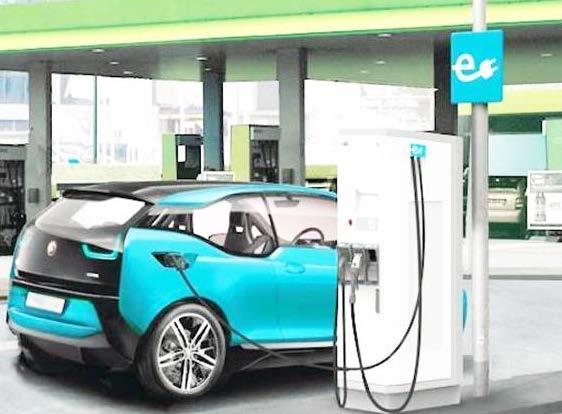
Okaya to deploy EV charging stations across India
Okaya Power has won the World Bank-funded contract from Energy Efficiency Services Limited (EESL) for the supply, installation, and commissioning of 1,020 multistrand EV charging stations across India.
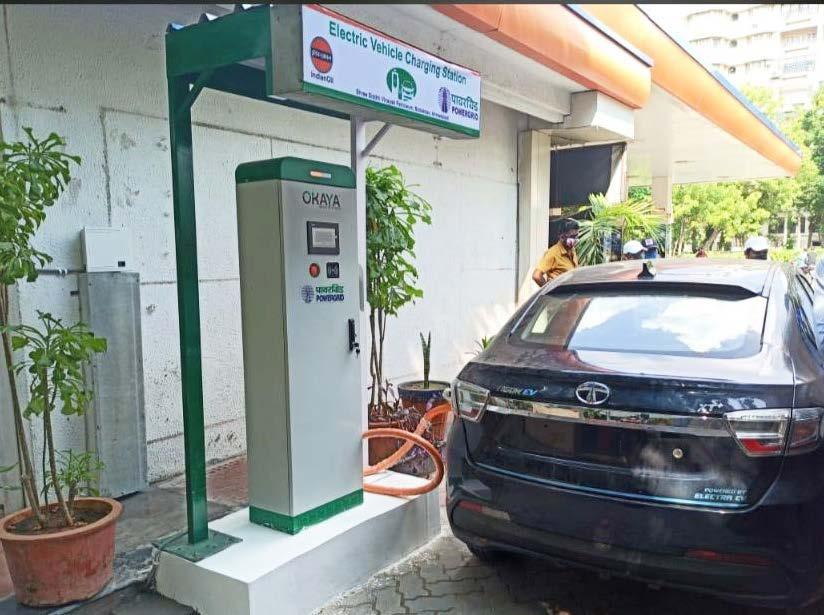
Okaya EV charging station. Source: Okaya Power
The multistrand EV charging stations that will be installed would be CCS, CHAdeMO, and Bharat specification protocol.
“We are delighted to be awarded the world bank funded contract from the prestigious EESL,” said Anshul Gupta, Director, Okaya Power. “Okaya has been at the forefront of delivering solutions towards building a sustainable EV ecosystem in India. Our long-standing association with EESL is another step forward in the direction and we are proud to partner with them yet again on this journey,” he added.
As one of the largest manufacturers of leadacid and lithium-ion batteries and a leading supplier of EV charging stations in India, Okaya has already deployed more than 500 EV charging stations in the past six months and 250 MWh battery energy storage system solution across the country.
“All these efforts of Okaya are intended towards contributing its bit in making ‘Atmanirbhar Bharat’ mission a success,” the company stated in their official statement.
Mahindra Electric unveils e-cargo-3W
Mahindra Electric has announced the unveiling of its new electric three-wheeler cargo model Treo Zor at the opening price of `2.73 lakh (ex-showroom Delhi). Built on the Treo platform, the new offering comes in three variants pick up, delivery van, and flatbed - and will be available at Mahindra small commercial vehicle dealerships in select cities across the country soon.
“Our Treo platform validates our obligation to Aatmanirbhar Bharat through the latest technology and ‘Make in India’. The Treo Zor will deliver a clean, sustainable and affordable solution for last-mile delivery,” said Pawan Goenka, MD & CEO of Mahindra & Mahindra Ltd.
The company claims that the new e-3W offers higher savings of over `60,000 a year, compared to the prevailing diesel cargo 3Ws, owing to its low maintenance cost, which stands at just 40 paise per km, the company said.
Treo Zor comes with an 8kW advanced lithium-ion battery and a best-in-segment payload of 550 kg. Also, the new vehicle comes with a standard warranty of 3 years/80,000 km, the company said, adding the vehicle can be charged by plugging into a 15AMP socket.
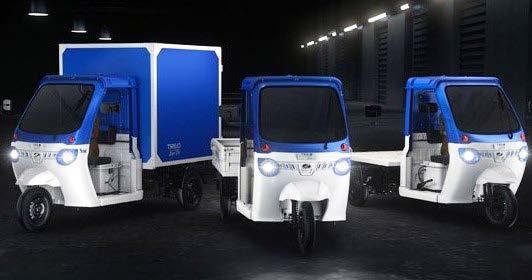
The wide service network of over 140 dealerships across India warrants opportune after-sales service as well. The other features comprise telematics unit and GPS, windscreen and wiping system, spare wheel provision, among others.
Bajaj Auto manufacturing plant for e-scooter
Pune-based two-and three-wheelers manufacturer Bajaj Auto Ltd is strategizing to set up a dedicated production plant for Chetak, its electric scooter.
The company is planning to ramp up production for Chetak and as a result is considering setting up a manufacturing unit with an annual capacity of half a million units.
The e-scooter is presently produced at the company’s Chakan plant, a unit that characteristically operates at near-100 percent capacity utilization around the year. It also rolls out premium KTM and Husqvarna bikes for the domestic as well as export markets from the site.
Delhi, Bangalore, and Hyderabad are among the key locations that are being assessed by the co-mpany to set up the proposed manufacturing unit.
Reji Mathai takes charge as ARAI Director
Dr. Reji Mathai has taken charge as the Director of the Automotive Research Institute of India (ARAI) from officiating Director, Neelkanth V. Marathe on December 2, ARAI said in a statement.
Before joining ARAI, Dr. Mathai was working as the Chief General Manager at the Indian Oil Corporation Limited (IOCL). He has been associated with IOCL for 28 years and is known to have contributed immensely in the field of engine and vehicle testing, emission studies, alternative fuels, ambient air quality, BS-VI and beyond.
Dr. Mathai holds a BE in Mechanical Engineering from Govindram Seksaria Institute of Technology and Science (SGSITS) Indore, Madhya Pradesh; and M Tech from Indian Institute of Technology, Varanasi (BHU). He also holds a management degree in 3-TP from the Indian Institute of Management, Ahmedabad, and Ph.D. in Alternative Fuels from IIT Delhi.
He is the recipient of the Petrofed Award for ‘Developing lubricant for marine engines’ in 2006-07 and has several publications at national and international forums and a few patents to his credit.
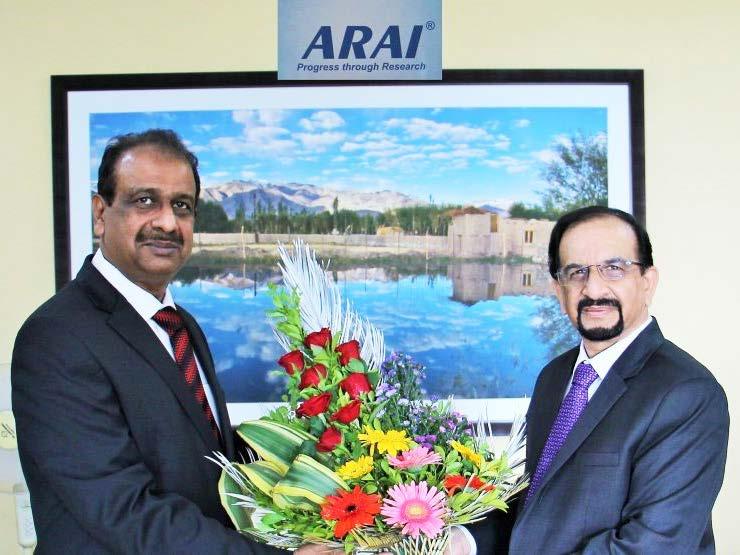
Dr Reji Mathai (Left) and Neelkanth Marathe. Source: ARAI
Tata Nexon EV exceeds 2000 sales milestone Ashok Leyland rebrands Optare as Switch Mobility
Tata Motors has announced that its electric vehicle, Nexon EV, has exceeded the 2000 sales milestone. In over 10 months, since the unveiling, the sales of the Nexon EV stretched 2200 units as of November 2020, representing the rapid demand for the EVs in the personal car segment. After rolling out its 1000th Nexon EV in August this year, the car clocked in another 1000 sales units in a record time of three months (Sept-Nov 2020). At present, Tata Motors is leading the EV segment with a 74 percent market share.
Appreciating the strong response from customers, Shailesh Chandra, President – Passenger Vehicle Business Unit, Tata Motors, said, “Offering thrilling performance, connected drive experience with zero emissions and at attractive pricing, the Nexon EV has found widespread acceptance among its customers. This growing demand is on the back of increased awareness, growing charging infrastructure, encouraging government incentives, breaking myths that surround EVs, and most importantly the undisputed benefits that it offers i.e., lower operating cost.”
Mr Chandra believes that with continued support from the government in terms of incentives like benefits on registration and road tax, EVs will soon become the most desirable and a mainstream choice for the customers in India. Ashok Leyland Ltd has announced that Optare Group Ltd (Optare), its majority-owned UK arm, has been rechristened as Switch Mobility Ltd (Switch) as part of its drive towards electrification and new mobility service. With the recommended new structure, Switch will be placed to become Ashok Leyland's global arm, concentrating on EVs and green mobility solutions.
Introducing the new logo and name, Dheeraj Hinduja, Chairman - Ashok Leyland, said that Optare is adopting a new identity and logo as 'Switch', which signals the parent's strategic ambitions in electric and green mobility. Towards this, Ashok Leyland is examining various options to bring all its EV initiatives under Switch Mobility.
This strategy echoes the clear growth prospects in the global LCV and e-bus market, which is anticipated to grow at a CAGR of more than 25 percent and to range $50 billion by 2030. "To capture part of that market, we are considering EV initiatives through Switch that could include financial participation and strategic tie-ups,” he added.
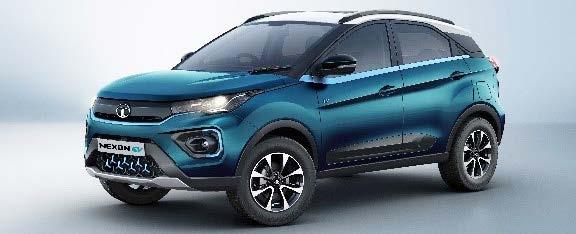
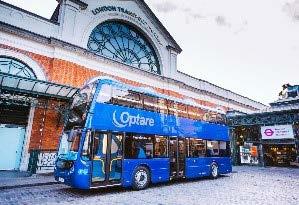
IIT-Madras, Ashok Leyland & Hitachi ABB partner for e-mobility project
IIT-Madras plans to operate e-bus services, with innovative to support the Indian EV revolution," said N Venu, charging technology, on the campus for students and staff. MD of Hitachi ABB Power Grids in India. It has signed an MoU with Hitachi ABB Power Grids in India and Ashok Leyland for the pilot project.
The e-bus will include Hitachi ABB’s innovative flashcharging technology Grid-eMotionTM Flash that will be delivered by Ashok Leyland. IIT-Madras will host the infrastructure to operate the flash charging system for the bus.
Smart e-mobility is at an emerging stage in India. While the government is endeavouring to scale up EV adoption to 30 percent by 2030, the mass public transport segment is mostly untouched. "We need to have all hands on deck - industry, academia, and policymakers to develop a strong and reliable local ecosystem Source: Ashok Leyland

BattRE launches RevOS powered RE:charge stations
Electric vehicle startup BattRE has announced the launch of RE:charge stations – low-cost EV charging stations powered by RevOS. Available at a price of ₹3,000, the low-cost charging solution is meant for installation at homes, offices, or individual shops. RE:charge stations can also provide an additional source of income for shop owners who can offer charging services to EV owners in the area. The RE:charge station owners can receive the payment directly through UPI.
“With the recommended guidelines of the Ministry of Housing and Urban Affairs, government of India, to permit the establishment of private charging stations at residences, workspaces, etc, we strongly believe our new offering RE:charge stations will help in speeding up the EV ecosystem in India,” said Nishchal Chaudhary.
He added that a low-cost EV charger can pave the way for an increasing number of charging stations across the country. The startup plans to add 500-plus EV charging stations in India by March 2021.
“Together, we introduce to you a peer-topeer charging network to further eliminate the range anxiety associated with EVs. It’s compact, costeffective, and can be installed anywhere with ease. Just Locate, Scan, Pay, and Use,” explained Jyotiranjan - Co-founder of

RevOS. Source: BattRE
Balan Engineering to set up EV unit in Bagalkot
The State government of Karnataka has given its affirmation for an EV manufacturing unit in Bagalkot district, the first-of-its-kind in North Karnataka.
The unit will be set up in Achanur village in Bagalkot by Balan Engineering. The company has also agreed to set up solar power plants and chemical units, which will help other companies invest in EVs in the future.
Balan Engineering has assured vehicles that can travel at a maximum speed of 125 kmph on a full battery. The company will start with the manufacture of e-3Ws for the transportation of garbage for urban local bodies. This will be followed by e-3W cargo vehicles, passenger automobiles, and bikes.
The manufacturing unit will be set up across more than 140 acres.
The Bagalkot plant will be a fullyintegrated unit, and is expected to generate hundreds of jobs directly and indirectly. The construction of the unit will begin in January 2021, and production will optimistically commence in the latter half of the year.
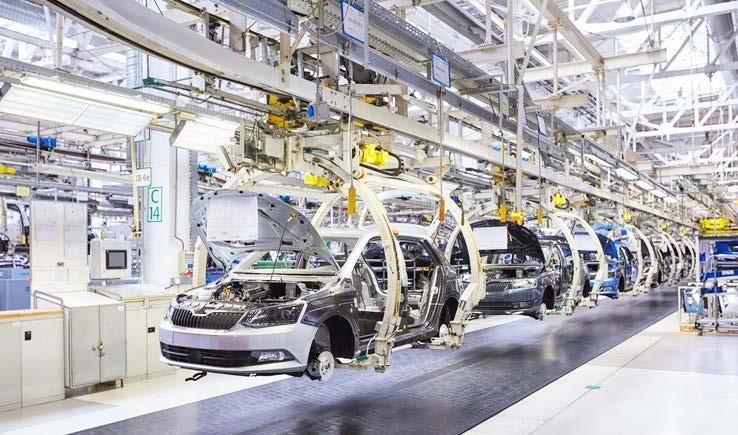
Electric Vehicles MG Motor-Tata Power superfast EV charging station launched
Kinetic Green unveils cargo e-3W
MG Motor India and Tata Power Corporation Limited have inaugurated the first superfast EV charging station in Nagpur. Further strengthening the EV ecosystem, the move is part of MG’s fresh partnership with Tata Power for positioning of 50 KW DC
Kinetic Green Energy and Power Solutions Ltd have unveiled its electric cargo three-wheeler, Kinetic Safar Jumbo, at `2.5 lakh.
Safar Jumbo is specially designed to meet the needs of the e-commerce companies and their logistics partners, offering them a sustainable last-mile delivery solution superfast charging stations across the country.
The public EV charging station is accessible to all vehicles attuned with CCS/ CHAdeMO fast-charging standards and is in line with MG’s commitment to providing a five-way charging ecosystem. The MG ZS EV can be charged up to 80 percent in 50 minutes at the facility. Other
Inauguration of MG Motors and Tata Power’s superfast EV charging Station in Nagpur, Maharashtra. Source: Tata Power Corporation Ltd.

at a very low cost of 50 paise per km, which will bring down the delivery cost.
Safar Jumbo has been designed ground up at Kinetic’s DSIR- recognized EV R&D lab. The company expects to deliver over 5,000 vehicles in the next six months. Progressively variants of charging options with the MG ZS, India’s first pure electric internet SUV – include - free-of-cost AC fastcharger installation at the customer’s home/office, extended charging network, a cable to charge anywhere, and charge-on-the-go with RSA (roadside assistance).
MG Motor has a total of 10 superfast 50 kW charging stations across its dealerships in five cities in India: New Delhi-NCR, Mumbai, Ahmedabad, Bengaluru, and Hyderabad, with alike expansions to more cities. Tata Power, on the other hand, has established an elaborate EV charging ecosystem with 200+ charging points in 24 different cities under the EZ Charge brand along with a digital platform to enable an easy and smooth customer experience. The MG-Tata Power partnership will comprise core values and operating models that are in line with their prevailing customer-centric approach.
the vehicle for different applications like gas cylinder distribution, waste collection, etc. would also be rolled out.
Kinetic Safar Jumbo, which falls under the L5 category, has a gross vehicle weight (GVW) of over 1 ton. It has a specially developed cargo box with close to 150 sq. ft. cubic capacity and a payload of 500 kg. The vehicle offers a top speed of 55 kmph and gradeability of 10 degrees. Its running cost is 50 paise per km as against over `3 per km for the diesel engine-based cargo three-wheelers.
Equipped with an advanced Li-ion battery pack, Safar Jumbo is designed to give a range of 120 km on a single charge. The vehicle will also be accessible on the swappable battery platform. The electric loader will be eligible for the FAME-II subsidy offered by the government and will come with a warranty of three years.

SIPCOT plans EV components manufacturing hub in TN
In an endeavor to make Tamil Nadu an EV manufacturing hub, SIPCOT (Small Industries Promotion Corporation of Tamil Nadu) is strategizing to develop an industrial park at an investment of `250 crore, in Manallur and Soorapoondi villages of Tiruvallur district.
The park, spread across 691.587 acres, will provide synthetic and organic chemicals, which are used in manufacturing batteries and components of EVs. Environmental clearance has been acquired from the Ministry of Environment, Forest, and Climate Change (MoFECC) for the development of SIPCOT in the two villages.
About 90 percent of the industrial park is marked for manufacturing EV components and the remaining 10 percent of the area for synthetic and chemical industries.
The companies that have displayed immediate and long-term interest involve electric two-wheeler company Ampere, Okinawa, and swap-able battery and charging infrastructure company SUN Mobility. The official further that SIPCOT plans to set up the industrial park by June 2021.
This comes close on the heels of the State government issuing a notification exempting EVs from payment of Motor Vehicles Tax from November 3, 2020, to December 31, 2022. This, a top industries department official said, will prompt more electronic car manufacturers and battery makers to set up shop in Tamil Nadu.
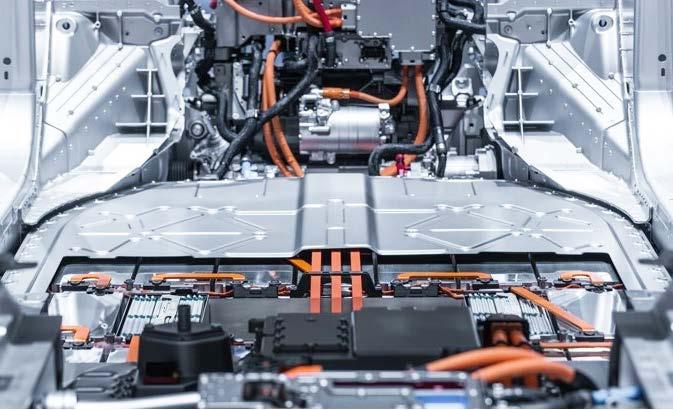
Image for representation only
Delhi govt. subsidies for 100+ EV models
The Delhi government has sanctioned more than 100 models of vehicles, comprising 45 brands of e-rickshaw, 14 of 2Ws, and 12 of 4Ws, for subsidy under the new electric vehicles policy, Transport Minister Kailash Gahlot said. "Vehicles priced up to `15 lakh will be entitled to the purchase incentive (subsidy), besides exemption of road tax and registration fee. Electric vehicles having a price of over `15 lakh will not get subsidy but will be eligible for road tax and registration fee exemptions," he further added.
The minister unveiled a website consisting of details of sanctioned models, dealers, subsidy disbursal process as well as a network of 70 charging stations across the city. He also said that 36 manufacturers have been listed with a network of 98 dealers across the city.
The complete process of subsidy payment will be online. Anyone obtaining an EV will need a sales invoice of the vehicle, Aadhaar number, and a canceled cheque to claim the subsidy. The dealer will process the subsidy claim at the customer’s end through the website. The claims will be certified by the motor licensing officers concerned and furthered to banks for subsidy payment. At each stage of processing of subsidy claim, from the dealer to the bank, the buyers will get updates through SMS.
Under its EV policy, the Delhi government will give incentives of up to `30,000 for e-2W, e-rickshaws and goods carriers, while a subsidy of `1.5 lakh will be provided for the purchase of electric cars, officials held.











